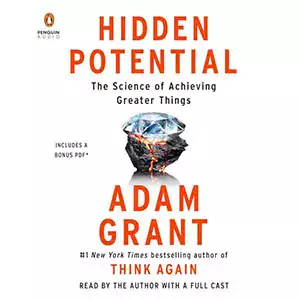Hidden Potential: The Science of Achieving Greater Things
Hidden Potential: The Science of Achieving Greater Things is a book by Adam Grant that explores the science of achieving your goals and overcome challenges. Grant is a professor of management and psychology at the Wharton School of the University of Pennsylvania. He is also the author of several other bestselling books, including Originals and Think Again.
In Hidden Potential, Grant argues that the key to achieving great things is not about having innate talent or ability. Instead, it is about developing the right character skills and motivational structures.
Grant’s book is based on extensive research in psychology and management. However, it is written in a clear and accessible style. It is a good book for anyone who wants to learn more about motivation and achievement, regardless of their background or level of expertise.
Grant identifies eight key character skills that are essential for achievement:
- Grit
- Curiosity
- Passion
- Resilience
- Optimism
- Creativity
- Social intelligence
- Self-awareness
Grant also discusses the importance of developing motivational structures, such as goals, feedback, and rewards. He argues that the best motivational structures are challenging, achievable, and aligned with our values.
Problem solving

Hidden Potential can help to solve a number of problems related to motivation and achievement. These include:
Procrastination
Grant argues that procrastination is often caused by a lack of motivation. People may procrastinate because they don’t know how to start a task, they feel overwhelmed by the task, or they don’t find the task interesting. By developing the right character skills and motivational structures, people can overcome procrastination and achieve their goals.
One way to overcome procrastination is to develop grit. Grit is the perseverance and passion to pursue long-term goals, even in the face of challenges and setbacks. People with grit are more likely to start tasks, stick with them, and finish them, even when they’re difficult or boring.
Another way to overcome procrastination is to develop curiosity. Curious people are interested in learning new things and solving problems. They are more likely to be motivated by tasks that challenge their intellect and creativity.
Finally, people can overcome procrastination by developing a growth mindset. People with a growth mindset believe that their intelligence and ability can be developed through effort and perseverance. They are more likely to view challenges as opportunities to learn and grow.
Imposter syndrome
Imposter syndrome is a common feeling of inadequacy and self-doubt, despite evidence of success. People with imposter syndrome may feel like they don’t deserve their accomplishments or that they are a fraud.
Develop self-awareness. Self-awareness is the ability to understand your own thoughts, feelings, and behaviors. By understanding your own patterns of thinking and behavior, you can identify and challenge the negative thoughts that contribute to imposter syndrome.
Develop a growth mindset. People with a growth mindset believe that their intelligence and ability can be developed through effort and perseverance. They are more likely to view imposter syndrome as a sign that they are challenging themselves and growing as a person.
People can overcome imposter syndrome by talking to others about their experiences. Imposter syndrome is a common experience, and talking to others about it can help to reduce feelings of isolation and shame.

Hidden Potential: The Science of Achieving Greater Things
By: Adam Grant
Narrated by: Adam Grant, Maurice Ashley, R. A. Dickey, Evelyn Glennie, Sara Maria Hasbun, Francis Idehen, Alison Levine, Benny Lewis, Kari Louhivuori, Nelli Louhivuori, Brandon Payne, Richard Pine, Gil Winch
Length: 7 hrs and 21 mins
Disclosure: As an Amazon Associate I earn commission from qualifying purchases or subscriptions through my links in this content.Fear of failure
Many people are afraid to fail, which can prevent them from taking risks and pursuing their goals. Failure is a natural part of life, and it is essential for learning and growth. People who are afraid to fail may avoid challenging tasks, miss out on opportunities, and never reach their full potential.
Develop resilience: Resilience is the ability to bounce back from setbacks and challenges. People with resilience are able to learn from their failures and use them as motivation to improve.
Develop a positive attitude towards failure. People who view failure as an opportunity to learn and grow are less likely to be discouraged by setbacks. They are more likely to keep trying and eventually succeed. People can overcome the fear of failure by setting realistic goals. When people set unrealistic goals, they are more likely to fail and become discouraged. By setting realistic goals, people can increase their chances of success and build confidence.
By developing the right character skills and motivational structures, people can overcome procrastination, imposter syndrome, and the fear of failure. These are all common challenges, but they can be overcome with effort and perseverance.
10 Best Headphones and Earbuds for Listening Audiobooks (2024)
 Bose QuietComfort 45 Wireless Bluetooth Noise Cancelling Headphones
Bose QuietComfort 45 Wireless Bluetooth Noise Cancelling Headphones JBL Tune 510BT: Wireless On-Ear Headphones with Purebass Sound
JBL Tune 510BT: Wireless On-Ear Headphones with Purebass Sound Sennheiser Consumer Audio HD 450SE Black Bluetooth 5.0 with Alexa Built-in – Active Noise Cancellation
Sennheiser Consumer Audio HD 450SE Black Bluetooth 5.0 with Alexa Built-in – Active Noise Cancellation Audio-Technica ATH-M20X Professional Studio Monitor Headphones
Audio-Technica ATH-M20X Professional Studio Monitor Headphones Soundcore by Anker Space Q45 Adaptive Active Noise Cancelling Headphones
Soundcore by Anker Space Q45 Adaptive Active Noise Cancelling Headphones Apple EarPods Headphones with USB-C Plug
Apple EarPods Headphones with USB-C Plug Sennheiser Consumer Audio MOMENTUM True Wireless 3 Earbuds
Sennheiser Consumer Audio MOMENTUM True Wireless 3 Earbuds JBL VIBE 100 TWS – True Wireless In-Ear Headphones
JBL VIBE 100 TWS – True Wireless In-Ear Headphones JBL Tune Flex – True Wireless Noise Cancelling Earbuds
JBL Tune Flex – True Wireless Noise Cancelling Earbuds Soundcore by Anker Liberty 3 Pro Noise Cancelling Earbuds
Soundcore by Anker Liberty 3 Pro Noise Cancelling EarbudsDisclosure: As an Amazon Associate I earn commission from qualifying purchases or subscriptions through my links in this content.Final Thoughts
Hidden Potential is a practical and insightful book on the science of motivation and achievement. It is a valuable resource for anyone who wants to achieve their full potential.
If you’re looking for a convenient way to learn about Grant’s insights, I recommend listening to the audiobook version of Hidden Potential. The audiobook is narrated by Grant himself, and he does a great job of bringing his work to life.
Listening to the audiobook is a great way to learn about Grant’s insights while you’re doing other things, such as commuting, exercising, or doing chores. You can also listen to the audiobook at your own pace, which is helpful if you want to take your time and absorb all of the information.
I hope you enjoy the book!












